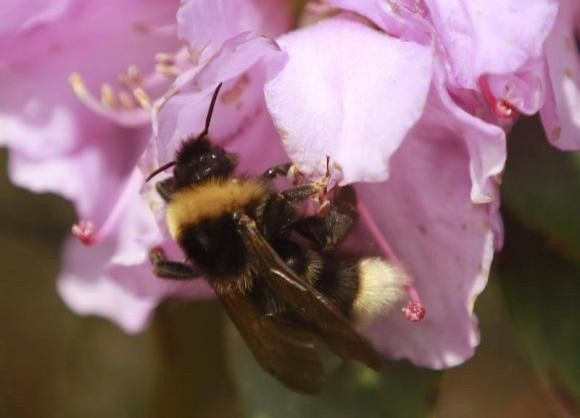Plant Toxins Affect Bee Behaviour And Reproduction

Plant toxins that accumulate in the nectar and pollen affect the reproduction and behaviour of insect pollinators and could cause a decline in the pollinator species, according to a recent study conducted by scientists at the University of Greenwich and Trinity College in Dublin. The research also emphasises considerations in plant propagation and landscape management. The research team is led by Professor Phillip Stevenson from the Royal Botanic Gardens Kew and Natural Resources Institute.
Rhodendron flowers and lupin were used to study the impact of naturally occurring toxins on bees. It was found that chemicals produced by plants as defence against herbivorous insects can accumulate at the nectar and pollen which the bees usually visit. In the study, bumble bees that were given pollen treated with the chemicals found in lupin plants called lupanine, produced fewer and smaller male offspring. Another plant chemical, called diterpenoids occurring in Rhododendrons, were found to be poisonous to honeybees and a wild mining bee species. The research suggests severe consequences could take place if insect pollinators mainly depend on these plants for food.
Lupins are widely cultivated and used as a protein source for various purposes. Australia is the leading producer and accounts for 95 percent of lupin production worldwide. According to the Australian Bureau of Agricultural and Resource Economics, the average annual production is 0.5 to 1.5 tonnes. Honey bee pollination services have been noted to play an important role in the production of lupins in Australia. Rhododendrons are used extensively as ornamental plants. Prior to this study, there have been reports of food intoxication caused by toxic honey made by bees from certain Rhododendron species.
The study clarifies that not all plant toxins are harmful to insects. Dr Stevenson and fellow researchers at Newcastle University demonstrated how caffeine in citrus and coffee plants enhanced honeybee memory and improved pollination as well. The research was able to demonstrate how plant chemicals affect pollination and the pollinators as well.
Professor Stevenson says, "Plant toxins need to be considered alongside other stressors on pollinators for their potential to impact ecosystems, so the next phase of our research will be to look at the interactive effects of plant chemicals with other stressors such as disease, so that we can determine whether plant chemicals exacerbate or ameliorate the effects of bee diseases."
The results of this study was presented at the joint meeting of the British Ecological Study and the Société Française d'Ecologie on December 12 in the Grand Palais, Lille.





















